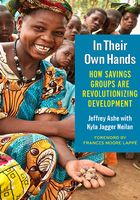
Embrace Learning and Innovation
Allowing for local control and respecting community input means constant improvement. Innovations from one village can spread only if the model is flexible and everyone involved is committed to learning. Using the principles of appreciative inquiry, NGO staff were periodically brought together and went through an exercise in which they were asked to define success in specific terms—a growing savings rate, excellent record keeping, and high attendance at meetings, among others. They were asked to rate how well the groups they were working with were meeting these objectives and then to come up with a plan for improving performance in any areas that lagged. Finally, to bridge the gap between planning and action, staff members were asked to commit to a specific action when they got on their motorcycles the next day to start to resolve this issue and to specify how success would be measured.
These principles are remarkably simple. In essence, each reflects the title of this book: In Their Own Hands: How Savings Groups Are Revolutionizing Development. If we truly believe that “they know how” and that our presence is to serve as a transitory catalyst of change, then the rest follows—scale, simplicity, building on what is there, sustainability, low cost, no giveaways, local control, setting standards, and embracing learning. I believe that this is the surest path to reaching the more than two billion people who could benefit and underpins my assertion that improving the lives of the poor need not be as complicated and costly as we once feared.